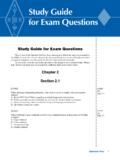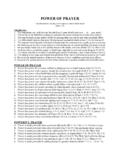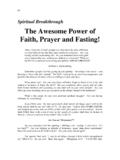Transcription of A guide to quitting Marijuana and Hashish - …
1 A guide to quitting Marijuana and Hashish Drug Addiction Treatment Centre Lund University Hospital Lund, Sweden Address: Lund University hospital Kioskgatan 17 S-221 85 Lund Sweden Phone + 46 46 178932 Fax + 46 46 176092 Email This is a guide for those who seriously want to quit using Marijuana and Hashish . THE STRUCTURE OF THE guide : Basic facts How does cannabis affect me? Why do I use cannabis? Why should I quit? Check your way of thinking as a cannabis user Cannabis a treacherous drug The process of quitting How do I stay off cannabis? BASIC FACTS Cannabis preparations ( Marijuana and Hashish ) contain about 420 compounds, of which about 60 are called cannabinoids.
2 The most important and examined compound is Delta-9-tetrahydrocannabinol (THC), which has psychoactive potency (not the only one). THC is also used to indicate the potency of the preparation (in percentage). Marijuana consists of of THC, sometimes with a content up of 30% of THC. Hashish 4% - 10% of THC, sometimes more. Hash oil 4% - 60% of THC. THC is fat soluble meaning that it accumulates body fat. It is gradually metabolized in these tissues to inactive metabolites, the most important is Delta-9-carboxy-THC which is 1/10 as active as THC. Another major metabolite produced is 11-hydroxy-THC, which is approximately 20 percent more potent than THC, and penetrates the blood-brain barrier more rapidly.
3 These metabolites are then excreted in the urine, faeces (2/3) and blood (1/3). The terminal half-life of THC is between 1-7 days, with an average 2-5 days and metabolites of THC can be found in urine as longs 10 weeks after smoking cessation. This slow and prolonged elimination of THC and its metabolites may be the origin of a chronic influence (see below).HOW DOES CANNABIS AFFECT ME? Cannabis has two effects on human cognitive functioning, an acute effect (1) and an additional chronic effect (2) 1. The acute intoxication consists of two phases. 2. The chronic influence is established after a period of regular heavy use. You who are a regular user will probably not recognize the description of the acute intoxication, but you may remember how it was several years ago.
4 1. Acute intoxication Phase one After about ten minutes, and up to 45 minutes after smoking, the user will experience a high (after smoking approx. 4-5 times) but initially also some physiological symptoms: Palpitation, dizziness, coughs, feeling of increased pressure inside the head, increased pulse, dryness in the eyes, mouth, and throat. You are also red-eyed and sensitive to light. Acute intoxication100% THC506 weeksChronic influenceElimination1/3 into the blood2/3 into the urine12345 Psychological symptoms of the subjective high are: A feeling of being mentally active and environmentally-oriented. A tendency to become giggly and talkative (for experienced smokers this is unusual).
5 Phase two Phase two is self-oriented with a feeling of being mentally active. It will last for about three to four hours. You who are an experienced smoker probably have a shorter period of acute intoxication (an hour and a half) and are thereby urged to smoke more often to achieve a high . This phase is mainly focused on the inner-self (like turning up the volume on your senses): You have an increased train of thoughts and you have a lot of associations to your thoughts. The colours you are looking at are more intense and your sense of smell makes the smells more salient. Details of an entity you earlier neglected are now more conspicuous. You like to sit and listen to music, watch videos or just hang around.
6 In the acute intoxication you find the positive reasons for smoking cannabis. Cannabis preparations influence your feelings in the same way as turning up the volume on the radio. Everything you experience becomes more intensive. In this condition it is easy to deny the negative effects (chronic influence) of cannabis. The acute intoxication gives you the following sensations: It gives you a feeling of being more calm and relaxed. It improves your social sensitivity. It enhances your sexual experiences. It enables you to cope better with difficult situations or persons. It serves to improve or enhance self-awareness. It increases your understanding of you and others.
7 It gives you more insight and tolerance about what is going on around you. 2. Chronic influence Clinical observations show that the use of cannabis more often than about every six weeks (elimination time of THC) for approximately two years, lead to changes in cognitive functioning. These changes create a new state of consciousness which can be described as a "cannabis state dependant" effect. This effect may result from the release of stored THC. It can be described as follows: Experimenting with cannabis, you are frequently acutely intoxicated and experience this state in relation to a normal non-intoxicated state of consciousness. The aftereffects are a passive, unreflecting, and blunt state of consciousness, lasting a day or two.
8 If you smoke again within a period of six weeks or less, these aftereffects last longer. You have gradually adjusted to this altered state of awareness and it will be your new normal state of consciousness. After a period of regular use you then experience the acute state of intoxication in relation to the effect of the chronic influence (being passive and blunt). After a critical period of chronic use, the acute state of intoxication is then perceived as one which creates a feeling of being capable and normal. This state lasts for two to three hours and is reported as weaker than day-to-day capacity in the non-intoxicated state. The effects vary with the doses used over time. Acutely intoxicated you will experience a feeling of capacity and a sense of being normal and thereby enabled to perform different tasks.
9 In the beginning you smoke to get stoned, but after a while (individually) you have to smoke to be normal and to get a nice feeling. Implications Most users are not aware of this process. To do something you first has to smoke cannabis. You are not using your full intellectual capacity. WHY DO I USE CANNABIS? There are many reasons why individuals are using pot. Therefore it is necessary and important that you find your reason to smoke pot. We know that common answers are to relax, to escape, forget and avoid (or postpone) to solve problems. Give three reasons, why you are smoking cannabis: Every cannabis smoker has his own pattern of use! You can discover your own by, asking yourself: Which joint is the most important one during a normal day?
10 Answer:.. Do you have to smoke a joint before you watch a movie, socialize with friends or when you want to listen to music? Check your dependence. 1. Do you have difficulties to stop thinking on cannabis? Never Sometimes Often Almost always 2. Is it more important for you getting high, than getting your next meal? Never Sometimes Often Almost always 3. Do you plan your day according to smoking opportunities? Never Sometimes Often Almost always 4. Do you smoke in the morning, at noon, and in the evening? Never Sometimes Often Almost always 5. Is getting high more important, than who it is you are smoking with? Never Sometimes Often Almost always 6. Do you smoke as much as you want, not bothering thinking of tomorrow?






